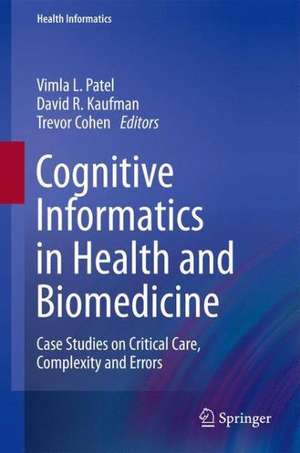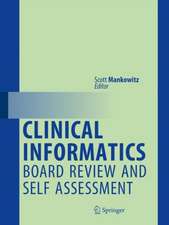Cognitive Informatics in Health and Biomedicine: Case Studies on Critical Care, Complexity and Errors: Health Informatics
Editat de Vimla L. Patel, David R. Kaufman, Trevor Cohenen Limba Engleză Hardback – 11 dec 2013
| Toate formatele și edițiile | Preț | Express |
|---|---|---|
| Paperback (1) | 363.90 lei 39-44 zile | |
| SPRINGER LONDON – 27 aug 2016 | 363.90 lei 39-44 zile | |
| Hardback (1) | 397.62 lei 6-8 săpt. | |
| SPRINGER LONDON – 11 dec 2013 | 397.62 lei 6-8 săpt. |
Din seria Health Informatics
- 5%
 Preț: 429.40 lei
Preț: 429.40 lei - 5%
 Preț: 458.30 lei
Preț: 458.30 lei - 5%
 Preț: 326.78 lei
Preț: 326.78 lei - 5%
 Preț: 418.60 lei
Preț: 418.60 lei - 5%
 Preț: 353.44 lei
Preț: 353.44 lei - 5%
 Preț: 787.58 lei
Preț: 787.58 lei - 5%
 Preț: 1038.14 lei
Preț: 1038.14 lei - 5%
 Preț: 269.08 lei
Preț: 269.08 lei - 5%
 Preț: 488.26 lei
Preț: 488.26 lei - 5%
 Preț: 570.44 lei
Preț: 570.44 lei - 5%
 Preț: 404.76 lei
Preț: 404.76 lei - 5%
 Preț: 342.02 lei
Preț: 342.02 lei - 5%
 Preț: 416.37 lei
Preț: 416.37 lei - 5%
 Preț: 384.04 lei
Preț: 384.04 lei - 5%
 Preț: 341.47 lei
Preț: 341.47 lei - 5%
 Preț: 385.01 lei
Preț: 385.01 lei - 5%
 Preț: 363.07 lei
Preț: 363.07 lei - 5%
 Preț: 735.46 lei
Preț: 735.46 lei - 5%
 Preț: 769.80 lei
Preț: 769.80 lei -
 Preț: 384.86 lei
Preț: 384.86 lei - 5%
 Preț: 727.44 lei
Preț: 727.44 lei - 5%
 Preț: 719.74 lei
Preț: 719.74 lei - 5%
 Preț: 724.14 lei
Preț: 724.14 lei - 5%
 Preț: 649.68 lei
Preț: 649.68 lei - 5%
 Preț: 723.21 lei
Preț: 723.21 lei - 5%
 Preț: 589.18 lei
Preț: 589.18 lei - 5%
 Preț: 1104.48 lei
Preț: 1104.48 lei - 5%
 Preț: 366.70 lei
Preț: 366.70 lei - 5%
 Preț: 905.70 lei
Preț: 905.70 lei - 5%
 Preț: 717.00 lei
Preț: 717.00 lei - 5%
 Preț: 1122.94 lei
Preț: 1122.94 lei - 5%
 Preț: 731.80 lei
Preț: 731.80 lei - 5%
 Preț: 776.78 lei
Preț: 776.78 lei - 5%
 Preț: 844.27 lei
Preț: 844.27 lei - 5%
 Preț: 1102.10 lei
Preț: 1102.10 lei - 5%
 Preț: 380.25 lei
Preț: 380.25 lei - 5%
 Preț: 720.84 lei
Preț: 720.84 lei - 5%
 Preț: 771.30 lei
Preț: 771.30 lei - 5%
 Preț: 717.73 lei
Preț: 717.73 lei - 5%
 Preț: 388.48 lei
Preț: 388.48 lei - 5%
 Preț: 423.84 lei
Preț: 423.84 lei - 5%
 Preț: 724.50 lei
Preț: 724.50 lei
Preț: 397.62 lei
Preț vechi: 418.55 lei
-5% Nou
Puncte Express: 596
Preț estimativ în valută:
76.10€ • 79.15$ • 63.78£
76.10€ • 79.15$ • 63.78£
Carte tipărită la comandă
Livrare economică 13-27 martie
Preluare comenzi: 021 569.72.76
Specificații
ISBN-13: 9781447154891
ISBN-10: 1447154894
Pagini: 432
Ilustrații: XXI, 505 p. 110 illus., 55 illus. in color.
Dimensiuni: 155 x 235 x 35 mm
Greutate: 1.13 kg
Ediția:2014
Editura: SPRINGER LONDON
Colecția Springer
Seria Health Informatics
Locul publicării:London, United Kingdom
ISBN-10: 1447154894
Pagini: 432
Ilustrații: XXI, 505 p. 110 illus., 55 illus. in color.
Dimensiuni: 155 x 235 x 35 mm
Greutate: 1.13 kg
Ediția:2014
Editura: SPRINGER LONDON
Colecția Springer
Seria Health Informatics
Locul publicării:London, United Kingdom
Public țintă
Professional/practitionerCuprins
Foreword.- Preface.- Introduction.- Paradigm Shift in Conceptualizing Error.- Analysis of Error based on Laboratory Studies.- Team Decision Making and the Analysis of Error.- Influence of Training on Error Detection in Simulated Clinical Rounds.- Opportunistic Decision Making and Workflow Patterns.- Decision Making and Deviations from Protocol in Trauma.- Effect of Information Seeking Activities on Clinical Decision Making.- Investigating Communication Complexity and Errors: A Continuity of Care based Approach.- Bridging Gaps in Transitions of Care: Design and Evaluation of Handoff Intervention Tool.- Driven to Distraction: Classifying Interruptions in Intensive Care.- Shared Mental Models in Team Handoff.- Enhancing Communication and Improving Coordination in ICU.- The interplay of organizational structure and communication practices.- Activity Prediction and Automated Workflow Modeling using RFID Sensors.- Sensor-based Tracking of Team Interactions and Clinical Workflow.- Work Domains, Complexity and Situation Awareness in the ED.- A framework for understanding error and complexity in critical care.- Communication and Complexity: Negotiating transitions in shift work and the coordination of patient care.- Learning and Competency: Role of Cognition and Error in the Complex Workplace.- A Framework for Complexity and Cognition in Technology-Rich Clinical Settings.- Clinical Practice.- Education and Training.- Biomedical Informatics.- Epilogue.
Recenzii
From the book reviews:
“‘Cognitive Informatics in Health and Biomedicine: Case Studies on Critical Care, Complexity, and Errors’ qualifies as required reading for those interested in healthcare safety and quality, for those engaged in clinical care delivery in complex settings, for those interested in understanding cognitive aspects of clinical decision-making, for future researchers investigating clinical errors, and for informaticians planning interventions to reduce the effects of errors.” (Randolph A. Miller, Journal of Biomedical Informatics, Vol. 49, 2014)
“‘Cognitive Informatics in Health and Biomedicine: Case Studies on Critical Care, Complexity, and Errors’ qualifies as required reading for those interested in healthcare safety and quality, for those engaged in clinical care delivery in complex settings, for those interested in understanding cognitive aspects of clinical decision-making, for future researchers investigating clinical errors, and for informaticians planning interventions to reduce the effects of errors.” (Randolph A. Miller, Journal of Biomedical Informatics, Vol. 49, 2014)
Notă biografică
Dr Vimla Patel is a Senior Research Scientist and Director of the Center for Cognitive Studies in Medicine and Public Health at the New York Academy of Medicine. Dr. Patel is an accomplished researcher in the areas of biomedical informatics, cognitive psychology and their application in health and medical care settings, especially in the areas of translation of evidence into practice. A leader in adapting methods and theories from cognitive science and in innovating new approaches to translating knowledge into action, Dr. Patel’s research explores the role of cognition in designing a safer clinical workplace, the complexity of group decision making underlying critical-care decisions, the generation of medical errors, and the impact of technology on human cognition for competent performance.
Dr. David R. Kaufman is a visiting Scholar at the New York Academy of Medicine. Dr. Kaufman’s primary research interests include human computer interaction in the context of health information technologies, information seeking behavior and decision making in healthcare contexts, and conceptual understanding of biomedical information and decision making by lay people. Trained as an educational psychologist and cognitive scientist, he has conducted several usability evaluation studies with a range of populations. Dr.
Trevor A. Cohen is an Assistant Professor in the School of Biomedical Informatics at the University of Texas Health Science Center, Houston and is affiliated with the Center for Cognitive Informatics and Decision Making. His primary research interest is in empirical distributional semantics – what machines can learn about meaning from unannotated text – and how this learning relates to human cognition. In addition, he has researched how humans detect and recover from error, in particular medical error.
Dr. David R. Kaufman is a visiting Scholar at the New York Academy of Medicine. Dr. Kaufman’s primary research interests include human computer interaction in the context of health information technologies, information seeking behavior and decision making in healthcare contexts, and conceptual understanding of biomedical information and decision making by lay people. Trained as an educational psychologist and cognitive scientist, he has conducted several usability evaluation studies with a range of populations. Dr.
Trevor A. Cohen is an Assistant Professor in the School of Biomedical Informatics at the University of Texas Health Science Center, Houston and is affiliated with the Center for Cognitive Informatics and Decision Making. His primary research interest is in empirical distributional semantics – what machines can learn about meaning from unannotated text – and how this learning relates to human cognition. In addition, he has researched how humans detect and recover from error, in particular medical error.
Textul de pe ultima copertă
This book is the first to address cognitive informatics (CI), a burgeoning discipline that cuts across several academic and professional disciplines. It contains examples drawn from the application of methods and theories from CI to challenges pertaining to the practice of critical care medicine and the management of life-threatening conditions.
Cognitive Informatics in Health and Biomedicine: Case Studies on Critical Care, Complexity and Errors focuses on the unifying themes of cognition, complexity, and the management of error in critical care practice and has been written by distinguished scholars who are leaders in their respective fields. The results reflect the interdisciplinary strengths of cognitive science, and offer a fresh insight into ways to investigate and mitigate errors and the role of health information technology in complex, dynamic environments such as the emergency room and the intensive care unit. The book will be of interest to students and a broad range of researchers in cognitive science, human factors, biomedical informatics, psychology, critical care specialists, computer science, linguists and anthropology.
Cognitive Informatics in Health and Biomedicine: Case Studies on Critical Care, Complexity and Errors focuses on the unifying themes of cognition, complexity, and the management of error in critical care practice and has been written by distinguished scholars who are leaders in their respective fields. The results reflect the interdisciplinary strengths of cognitive science, and offer a fresh insight into ways to investigate and mitigate errors and the role of health information technology in complex, dynamic environments such as the emergency room and the intensive care unit. The book will be of interest to students and a broad range of researchers in cognitive science, human factors, biomedical informatics, psychology, critical care specialists, computer science, linguists and anthropology.
Caracteristici
The first reference on cognitive informatics Incorporates concepts from prominent researchers, critical care specialists, psychologists, computer scientists, medical informaticians, linguists and anthropologists Focuses on key examples drawn from the application of methods and theories from CI to challenges pertaining to the practice of critical-care medicine Includes sections dedicated to pedagogical learning via the use of summaries, study questions, further readings and lessons learned?






















